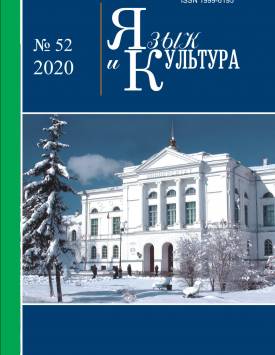Pragmatic and Functional Approaches in Teaching / Learning of a Professionally-oriented Foreign Language
Teaching and learning of a professionally-oriented language in the High School is viewed from a multidisciplinary approach. Pragmatic and functional components are considered to be the core ones in a teaching and learning process. The targeted request of the university students aims at the formation of universal cultural and professional competences. The students need to study theoretical materials in Macroeconomics, the Economy of Enterprise, Corporate Management, Organisational Culture of Global Corporations and Multinationals, International Management, Crisis Management, Negotiations, Advertising, Marketing etc. A complex theoretical, linguistic, practical, informational and analytical training of students enables communicative problem-solving in varied spheres of the social, cultural, professional and academic activities, and efficient communication with international partners in oral and written formats. It is also focused on professional and personal self-studying as well. The paper depicts methodology and specific approaches that had been worked out in course of the following disciplines: “Professionally-oriented English”, “Business English” and “English in the Business Environment” for the students of the educational streams 38.03.01 “Economics” and 38.03.02 “Management” at the Institute of Economics, Finance and Public Administration at Siberian Federal University (Krasnoyarsk, Russia). A professionally-oriented foreign language teaching experiences another span of the educational paradigm challenging timely transformation of varied processes in the sphere of High Education in the Russian Federation. The subject matter of the Applied Linguistics is a foreign language teaching including methodology. There is an axiom proposition regarded applied issues in the sphere in question: they are directed towards a functional optimization of the real language and a language that is considered to be a means of instruction in the High School. Along with a so called “engineer approach”, optimization is defined by a task. In the case of ours it might be students’ satisfaction of their demands aimed at receptive and productive skills acquisition necessary for business and professional communication. Different stakeholders, such as students and their parents, University managerial circles, the Ministry of High Education and Science. The Russian high educational establishments survive differently a transformative stage accompanied by a set of complicated and controversial structural processes. Gradual renovation of concepts and terminology intertwined with language methodology is strongly noticeable nowadays. Moreover, applied linguists contribute greatly into efficient teaching of foreign languages (SLA -second language acquisition in the Western tradition). They are interested not only in language acquisition in the classroom, but in the speech acts and social interaction, as well as in interdisciplinary bonds with sociology of language, medicine and law. The author’s concept reflects practical experience in professionally-oriented language teaching in synchronous and asynchronous ways during the coronavirus pandemic in 2020.
Keywords
professionally oriented foreign language, interdisciplinary approach, communicative situation, intercultural pragmatics, social variety, pragmatic errors, metalinguistic competencesAuthors
| Name | Organization | |
| Grishaeva Elena B. | Siberian Federal University | egrishaeva@sfu-kras.ru; e-grisha-eva@mail.ru |
References

Pragmatic and Functional Approaches in Teaching / Learning of a Professionally-oriented Foreign Language | Yazyk i Kultura – Language and Culture. 2020. № 52. DOI: 10.17223/19996195/52/9
